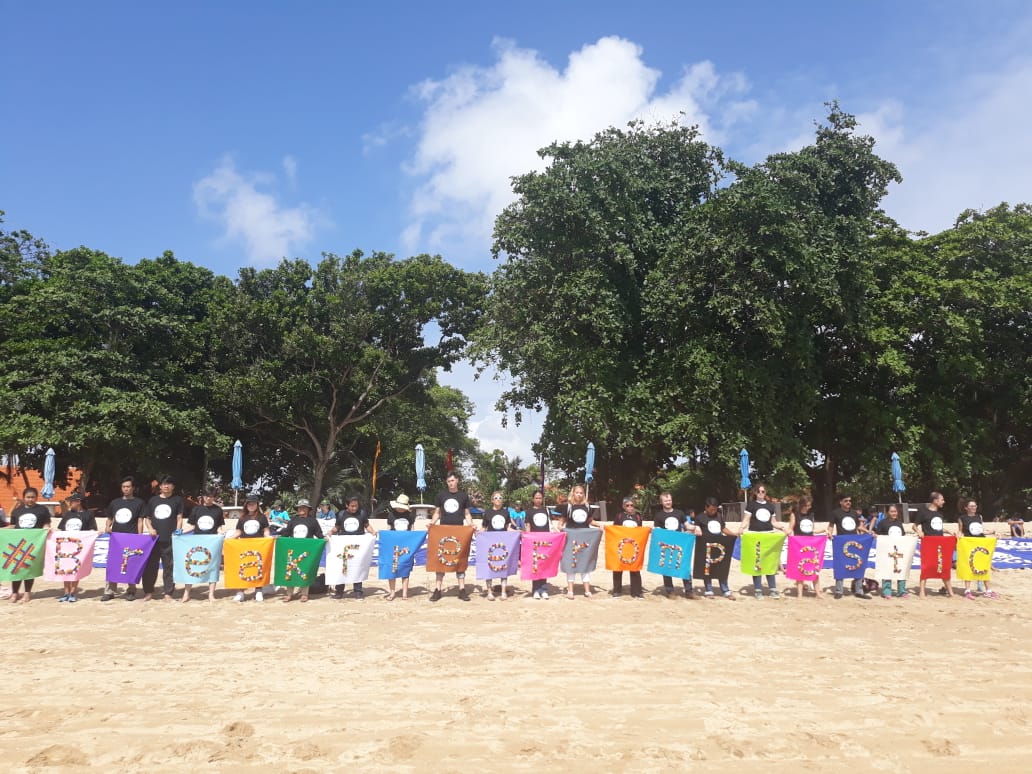FOR IMMEDIATE RELEASE
Bali, Indonesia (October 28, 2018) — On the eve of Our Ocean Conference 2018, the global #breakfreefromplastic movement challenged corporations to demonstrate real leadership to reverse the plastic pollution crisis instead of making more hollow commitments and empty gestures, which only tend to perpetuate the problem.
“To put an end to the plastic pollution crisis, corporations need to step up with meaningful, game-changing and authentic measures that would significantly reduce their plastic footprint and move our societies away from the scourge of single-use, throwaway and problematic plastic packaging,” said Von Hernandez, Global Coordinator of #breakfreefromplastic.
Movement leaders asserted that corporations have the ability and resources to solve the problem if they want to, but lamented that no large company has yet had the courage to implement serious plastics reduction policies and institute new delivery systems that do not rely on disposable, throwaway plastic.
A recently published Greenpeace report highlights that plans by 11 of the world’s biggest fast-moving consumer goods corporations (FMCGs) actually allow for an indefinite increase in their use of single-use plastics, with no company planning to put the brakes on the growing production and marketing of single-use plastics.
The four companies that reported the highest sales of single-use plastic products (Coca-Cola, PepsiCo, Nestlé and Danone) were also the top four brands identified in a recent global Break Free From Plastic brand audit report following 239 plastic pollution cleanups in 42 countries.
“If we allow these corporations to carry on with business as usual, global plastic production will continue to rise, further aggravating the plastic pollution crisis. We need them to commit to ambitious plastics use reduction targets. The planet needs real solutions. The time for greenwashing is over,” said Graham Forbes of Greenpeace.
“It is ironic that the companies whom our brand audits have identified as topnotch polluters are the same companies who typically relish sponsoring beach cleanups. The planet would be better served if they would clean up their acts instead.” said Jane Patton, who coordinated #breakfreefromplastic’s most recent brand audits.
For her part, Delphine Lévi Alvarès, Coordinator of the Rethink Plastic alliance said, "this week, the European Parliament has shown that it is possible to take strong legislative action on plastic pollution. As governments start taking responsibility for resolving this crisis, so too must corporations! Given the scale of the problem, we can no longer rely on voluntary and arbitrary targets coming from corporations.”
Warning of false solutions promoted by companies to greenwash their image and wash their hands of responsibility for the crisis, the global movement issued a Leadership Challenge to fast-moving consumer companies, which includes demands to:
- Reduce (their) single-use plastic production and usage with a clear action plan and timeline and transparently reporting on their plastic footprint ;
- Invest in alternative product delivery systems, while disincentivising single-use, throwaway packaging;
- Reject false and unproven solutions like thermal waste-to-energy incineration, plastic to fuel schemes, chemical recycling and other regrettable replacements;
- Collaborate with retailers, governments and NGOs to create scalable solutions to plastic pollution - including support for ambitious legislation that rewards plastics reduction and penalizes plastics overuse.
According to the World Economic Forum, up to 12 million tonnes of plastic, often single-use items including packaging, enter the sea from land every year. With plastic production expected to increase by 40% in the next decade, making it almost impossible for waste management and recycling schemes to keep up.
Multinational consumer brands have been flooding Asian countries with single-use plastic packaging, despite knowing that the resulting waste will inevitably pollute these terrestrial and marine environments in the region,
“Despite the best efforts of our kelurahan (villages) to compost and recycle as much as they can, we are still left with waste that are beyond our capacity to manage. We call on companies to eliminate or redesign these problematic products and packaging and for the Indonesian government to ban straws, plastic bags, styrofoam, sachet, and microbeads,” Yuyun Ismawati from Alliance Zero Waste Indonesia (AZWI) emphasized.
Groups belonging to AZWI have been demonstrating zero waste solutions for communities across Indonesia, with a focus on waste prevention, segregation and composting.
The annual Our Ocean Conference brings together representatives of governments, civil society, science, finance and businesses from around the world to discuss ocean protection and pledge commitments. //ends
__________________________________________________________________________
Break Free From Plastic is a global movement of more than 1,400 member groups and thousands of individuals united around a common goal: to bring systemic change through a holistic approach that tackles plastic pollution across the entire plastics value chain, focusing on prevention rather than cure and on providing effective solutions.
Contact: Jed Alegado
#breakfreefromplastic Asia Pacific Communications Officer
+63917-607-0248




